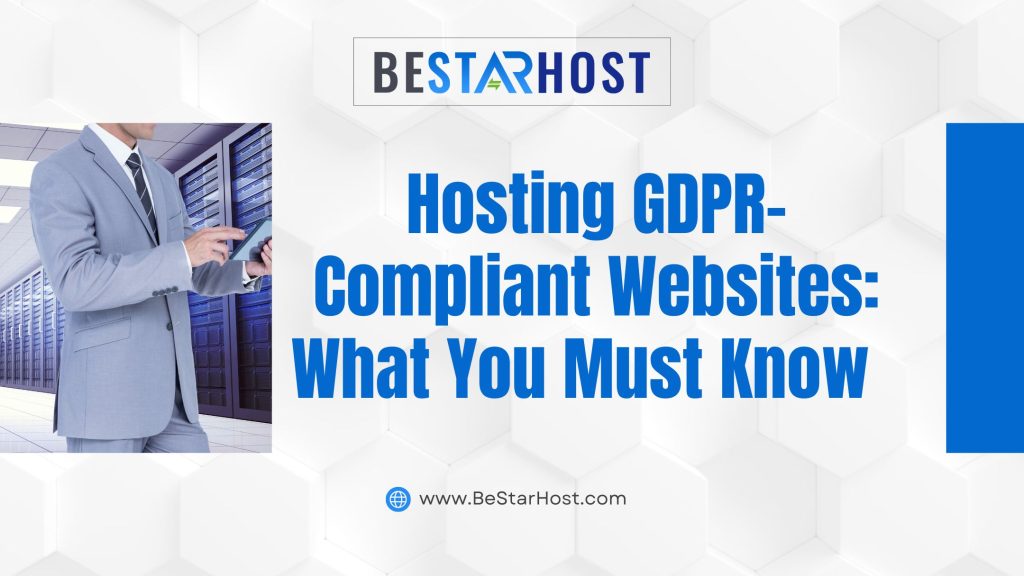 In the era of increasing digital surveillance and user data collection, the General Data Protection Regulation (GDPR) sets the gold standard for data protection in the EU. If your website collects or processes personal data from EU citizens, you must ensure your web hosting meets GDPR compliance requirements — even if your business is outside Europe.
In the era of increasing digital surveillance and user data collection, the General Data Protection Regulation (GDPR) sets the gold standard for data protection in the EU. If your website collects or processes personal data from EU citizens, you must ensure your web hosting meets GDPR compliance requirements — even if your business is outside Europe.
In this blog, we’ll explain what GDPR-compliant web hosting means, what to look for in a hosting provider, and how to keep your website secure and legally protected.
What Is GDPR and Why Does It Matter for Hosting?
GDPR is a data privacy law introduced by the European Union in 2018. It aims to protect the personal data of EU residents by enforcing strict rules on how data is collected, stored, and processed.
Why does web hosting matter?
Because your hosting provider handles and stores personal data collected on your site (e.g., via contact forms, sign-ups, transactions), they are considered a data processor under GDPR. This means they also bear responsibility for data privacy and security.
Key GDPR Website Hosting Requirements
When choosing a GDPR-compliant hosting provider, look for the following requirements:
1. Data Processing Agreement (DPA)
The hosting provider must offer a DPA, which outlines their responsibilities as a data processor and confirms their commitment to GDPR principles.
2. Servers Located in the EU (or with Adequate Safeguards)
For European data protection hosting, data should ideally be hosted on servers within the European Economic Area (EEA). If hosted elsewhere, your provider must comply with mechanisms like Standard Contractual Clauses (SCCs) to ensure safe data transfers.
3. Strong Security Measures
A secure hosting for GDPR compliance must include:
-
SSL certificates
-
Firewall protection
-
Regular software updates
-
Data encryption (at rest and in transit)
-
Intrusion detection systems
4. Transparent Data Handling
The host should provide clear information on:
-
What data they access
-
How they store it
-
Who has access
-
How long data is retained
5. Backup and Disaster Recovery
Data loss can lead to GDPR violations. Your host should maintain:
-
Regular backups
-
Secure storage locations
-
Fast disaster recovery plans
Best Practices for GDPR Website Hosting Compliance
Even with a compliant host, the responsibility doesn’t end there. You must also ensure:
-
Consent-based data collection – Use GDPR-compliant cookie banners and privacy notices.
-
User data rights – Provide options to access, modify, or delete personal data upon request.
-
Minimal data retention – Store personal data only for as long as necessary.
-
Third-party compliance – Any third-party plugins or analytics must also meet GDPR standards.
Top Features of GDPR-Compliant Web Hosting
| Feature | Why It Matters |
|---|---|
| EU-based data centers | Ensures lawful data processing |
| DPA agreement | Defines legal responsibility |
| ISO 27001 certification | Indicates high data security standards |
| GDPR-trained support staff | Reduces compliance risk |
| Data breach notification process | Required within 72 hours per GDPR |
Recommended GDPR-Compliant Hosting Providers
Here are some trusted data privacy compliant hosting options:
-
SiteGround – Offers servers in multiple EU locations with strong GDPR support
-
A2 Hosting – Provides a GDPR DPA and security-focused hosting
-
IONOS by 1&1 – Based in Germany with robust privacy laws
-
Kinsta – Offers EU servers, DPA, and secure WordPress hosting
-
Scala Hosting – Includes advanced security and GDPR compliance features
🛡️ Tip: Always review a host’s privacy policy and ask about GDPR readiness before signing up.
GDPR compliance is not just about installing a plugin or adding a privacy policy. It begins with choosing the right foundation — your hosting provider. By selecting a GDPR-compliant web hosting provider and implementing strong data privacy practices, you build trust with users and avoid costly legal risks.
Looking for reliable and secure hosting for GDPR compliance?
Explore our recommended hosting providers to ensure your website meets European data protection standards.
Frequently Asked Questions (FAQs)
✅ Does my hosting provider need to be in Europe for GDPR compliance?
Not necessarily, but they must provide adequate safeguards (like SCCs) for data transfers outside the EU.
✅ What is a DPA in web hosting?
A Data Processing Agreement is a legal contract required under GDPR that outlines how your host processes and protects user data.
✅ What happens if I host a site without GDPR compliance?
You risk heavy fines (up to €20 million or 4% of annual turnover) and damage to your brand’s reputation.
